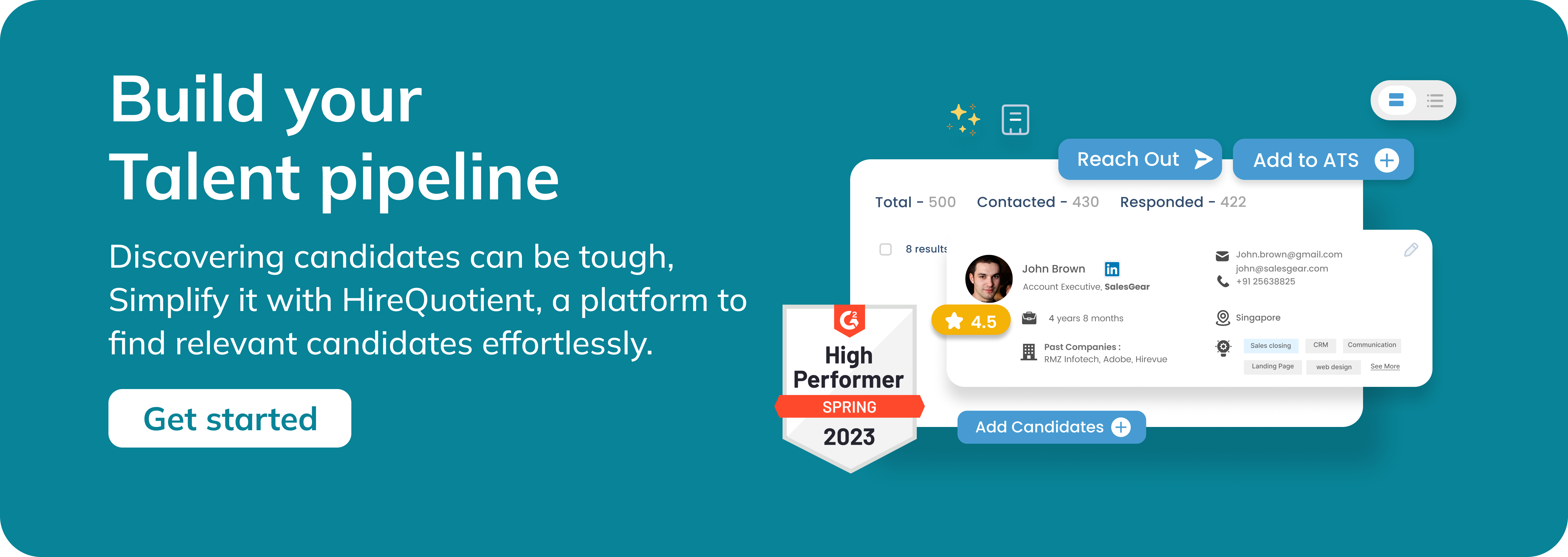How Many Hours Can Salaried Exempt Employees Be Forced to Work?
Published on April 5th, 2025
As an HR leader, recruiter, or manager, knowing how many hours salaried exempt employees can be required to work is not just a compliance matter; it's a productivity, morale, and long-term employee retention matter.
Here’s what you need to know about managing exempt employees working hours while maintaining fair expectations and compliance.
First Things First: What is "Exempt"?

To understand the number of hours salaried exempt workers may be required to work, we need to first define "exempt" in the context of the Fair Labor Standards Act (FLSA).
Exempt employees are salaried employees who are not owed overtime pay, regardless of the number of hours worked. They usually work in managerial, professional, or specialty positions, and are paid for their results instead of the number of hours they work. They compensated for their performance rather than the number of hours spent on the job.
Under the FLSA (Fair Labor Standards Act), exempt employees must qualify for three basic tests for exemption:
Salary Basis Test
Exempt employees are paid a fixed salary that is not contingent on the number of hours worked.
Salary Level Test
Exempt employees must receive a minimum of $1,128 per week (equivalent to an annual salary of $58,656) as of January 2025.
Duties Test
Their role must involve executive, administrative, or professional duties, often referred to as "white-collar exemptions."
These guidelines serve as the foundation for determining what exempt workers may be required to do, particularly regarding working hours.
Implications for Employers Managing Salaried Exempt Employees
- No Legal Restrictions on Hours: There are no legal restrictions on hours, meaning exempt employees are expected to complete their work regardless of hours. For example, they receive the same salary whether they work 30 or 50 hours a week.
- 40-Hour Workweek: Many employers set a standard 40-hour workweek, with flexibility for peak periods or special projects.
Even though exempt employees do not fall under an exact hourly work schedule, employers must consider the number of times they expect employees to work extended hours. There is a tipping point at which expectations of work outweigh the health and safety of the worker.
Can Employers Legally Ask Salaried Exempt Employees for Long Hours?

Yes, employees can be asked to work long hours by their employers. While performance is the primary expectation, excessive hours without proper control can harm both employees and the organization, creating a negative perception. The Fair Labor Standards Act gives employers flexibility in the hours that exempt employees work.
However, if an employer regularly requires exempt employees to work excessive hours, they would experience:
- Employee burnout: Fatigued employees are more likely to be disengaged and burned out.
- Loss of productivity and creativity: Fatigue hinders creativity, decision-making, and problem-solving.
- Increased error and accident rates: Overworked employees are likely to create more errors and be more prone to workplace accidents.
- Increased absenteeism and turnover: Overworked employees are more likely to take unplanned leave or voluntarily quit.
While employers are entitled to ask for more than the regular 40-hour week, it is necessary to keep a fair balance. Overloading exempt employees will surely backfire in no time and affect the business as a whole.
The Importance of Setting Reasonable Expectations for Salaried Exempt Employees
Establishing clear and reasonable expectations is essential to maintaining employee health, morale, and job satisfaction. Employers can maintain a healthy workplace environment and foster long-term retention by providing employees with reasonable working hours and defined expectations of their duties.
Benefits of reasonable expectations:
- Greater employee retention: Employees who feel valued and respected are more likely to stay employed at the company.
- Increased productivity: Overworked employees can never be focused, creative, and efficient.
- Better morale: Having reasonable expectations provides clear expectations for employees, identifying a clear, positive work environment where employees feel respected.
Think about formalizing expectations between you and your employees through written policies and open communication. Clear communication aligns everyone and prevents miscommunication on work hours and work performance. Here’s how you can set clear expectations:
- Regular Work Hours: Set standard work hours, but be flexible during peak times or special projects.
- Peak Season Expectations: Clearly define when additional hours may be required and ensure employees are aware of when to anticipate those peak times.
- Time-Off Policies: Define policies for paid time off (PTO), personal time, and emergency leave in a transparent manner so employees know how they can be utilized without penalty.
- Remote Work Expectations: Define availability and communication standards for remote or hybrid work arrangements.
Industry-Specific Regulations on Working Hours for Salaried Exempt Employees
Though the FLSA is flexible, there are some industries with additional rules or safety regulations that limit the number of hours salaried exempt employees can work.
For example:
- Healthcare workers are likely to have shift length limitations to avoid fatigue-related risks.
- Aviation has strict regulations from the FAA to limit pilot hours.
- Public safety and transportation jobs may have some state or federal-level restrictions.
Employers should stay updated on state labor laws, which may be stricter than federal ones. For instance, there are strict regulations in California regarding exempt classification and deductions from wages. Always consult legal advisers or compliance experts within the HR department when navigating industry-specific or state-specific regulations.
Best Practices for Managing Salaried Exempt Employees
Some best practices can help businesses get the most out of exempt staff without overworking employees:
- Regular check-ins – Encourage managers to perform regular one-on-ones with employees to get a sense of their workload and stress levels.
- Encourage employees to use time off – Encourage employees to use their PTO and set the example.
- Invest in manager training – Provide tools and resources to develop the ability to see the early signs of burnout.
- Clarify job responsibilities – Clarify what the exempt employees’ job responsibilities are so they can plan priorities.
- Analyze workforce data – Monitor trends of volume, overtime, and satisfaction to make operational work adjustments and mitigate overwork.
How to Manage Remote and Hybrid Salaried Exempt Employees?
Managing salaried exempt employees is more complicated now with the increase of remote and hybrid work. Remote work provides flexibility for employees but relies on open communication and clear expectations to ensure fairness and accountability. Here is how to manage remote or hybrid salaried exempt employees:
- Core Availability Hours: Set standards for when workers are expected to be available throughout the day, considering time zones if your workforce is international.
- Communication Standards: Set clear guidelines for response times (example: email response within 24 hours) to ensure everyone is on the same page.
- Emergency Procedures: Establish protocols for dealing with urgent work requests or high-priority projects that may necessitate employees to work beyond regular hours.
- Workload Management: Ensure remote or hybrid workers have the same opportunities for feedback and workload adjustments as in-office employees.
Through providing clear structure and frequent check-ins, you can ensure remote teams are as productive and engaged as on-site teams.
Managing Time Off for Salaried Exempt Employees
For salaried exempt employees, taking a day off for personal reasons or sickness is usually not an issue, but it's important to understand how to manage time off correctly.
Salaried exempt employees are not to receive overtime or extra compensation for work done over and above the normal schedule. But deductions from their salary for brief-day absences are typically banned. Employers, however, can:
- Withhold from PTO: If a salaried exempt employee takes a half-day for personal reasons, employers may withhold from their PTO bank (if their policy permits this).
- Deductions from wages are permitted only in particular situations, like full-day absence for personal reasons or disciplinary suspension.
Failure to comply with these rules can result in legal penalties, such as fines or back pay for employees.
Aligning Compensation with Salaried Exempt Employees Responsibilities
When salaried exempt employees consistently take on additional responsibilities or work overtime, it may be time to reassess their compensation. Exempt status should not be a license to overload employees without recognition.
When assessing an employee's expanded duties, think about the following:
- Performance bonuses or raises: Acknowledge employees who are willingly going above and beyond their job description.
- Reclassification: If job duties have increased substantially, perhaps it's time to look at their job classification or to look at the compensation plan.
- More resources: Supply resources or people to help manage the increased amount of work, if any are available.
Compensation should be in line with the work being performed, so that employees feel that they are being compensated and valued for their work.
The Bottom Line
Employers need to keep in mind employees' well-being in a very productive workplace, even if they are not statutorily bound to limit working hours for salaried exempt employees. Employers can support salaried exempt employees by clearly outlining expectations, handling workload effectively, and treating employees reasonably and fairly. Ultimately, it's about finding a balance for business needs and employee needs and creating a social contract whereby both the employer-employee relationship, based upon mutual respect, productivity, and communication, can be sustained and valued.
A Smarter Way to Hire and Manage Workloads
If you are a business trying to find a better way to intelligently hire candidates while managing workloads, EasySource will make it even easier.
With our AI-based solution, sourcing candidates is better, outreach is more personal for the candidate, and we can improve hiring diversity.
- AI Filters: Easily search for candidates by location, skill sets, and experience.
- LinkedIn Integration: Messages can be automated and sent in bulk.
- Automated outreach: Take back some time for interviews and relationship building by automating repetitive/tedious tasks.
- Diversity and Efficiency: Target skills and qualifications, with a diverse and competent workforce.
If you’re looking to improve your hiring results while maintaining an effective workflow environment for your employees? Start EasySource today!
Authors

Vinaya Birkodi
Vinaya is a Social Media Strategist and Content Writer with a passion for content that connects. She blends data, trends, and storytelling to craft content that doesn’t just perform it resonates. When she’s not decoding algorithms or building brand love online, you’ll find her exploring creative outlets like photography and short-form video. Always online, always on-brand.
Hire the best without stress
Ask us how
Never Miss The Updates
We cover all recruitment, talent analytics, L&D, DEI, pre-employment, candidate screening, and hiring tools. Join our force & subscribe now!
Stay On Top Of Everything In HR


